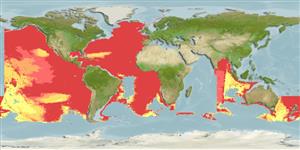Teleostei (teleosts) >
Lophiiformes (Anglerfishes) >
Diceratiidae (Double anglers (Ref. 07463) or Doublespine Seadevils (Ref. 86949))
Etymology: Diceratias: Greek, di = two, double + Greek, keras or keratos = horn, horned (referring to the two conspicuous dorsal-fin spines in the larvae and young females) (Ref. 86949); pileatus: From the Latin pileatus meaning capped, referring to the terminal papilla of the esca (Ref. 39830).
Environment: milieu / climate zone / depth range / distribution range
Ecology
Marine; bathypelagic; depth range 640 - 1430 m (Ref. 58302). Deep-water
Eastern Atlantic: four records along the African coast north of the equator. Western Atlantic: both tropical and subtropical.
Size / Weight / Age
Maturity: Lm ? range ? - ? cm
Max length : 23.5 cm SL male/unsexed; (Ref. 6939)
Dorsal spines (total): 0; Dorsal soft rays (total): 5 - 7; Anal spines: 0; Anal soft rays: 4. Distinguishing characteristics of metamorphosed female: relatively small esca, width about equal to length; conspicuous bulbous posteriorly oriented terminal escal papilla; absence of posterior and anterior escal appendages; escal pore at posterobasal margin of terminal papilla; teeth in lower jaw 25-65, upper jaw with 27-82 teeth; vomerine teeth 4-14 (Ref. 86949).
Found near or on continental shelf, old specimens probably benthic (Ref. 6939). Bentho-, meso- and bathypelagic (Ref. 58302).
Life cycle and mating behavior
Maturity | Reproduction | Spawning | Eggs | Fecundity | Larvae
Bertelsen, E., 1990. Diceratiidae. p. 496-497. In J.C. Quero, J.C. Hureau, C. Karrer, A. Post and L. Saldanha (eds.) Check-list of the fishes of the eastern tropical Atlantic (CLOFETA). JNICT, Lisbon; SEI, Paris; and UNESCO, Paris. Vol. 1. (Ref. 6939)
IUCN Red List Status (Ref. 130435: Version 2024-2)
Threat to humans
Harmless
Human uses
Tools
Special reports
Download XML
Internet sources
Estimates based on models
Preferred temperature (Ref.
123201): 2.5 - 9, mean 5.6 °C (based on 436 cells).
Phylogenetic diversity index (Ref.
82804): PD
50 = 0.6406 [Uniqueness, from 0.5 = low to 2.0 = high].
Bayesian length-weight: a=0.01995 (0.00906 - 0.04395), b=3.01 (2.83 - 3.19), in cm total length, based on all LWR estimates for this body shape (Ref.
93245).
Trophic level (Ref.
69278): 4.1 ±0.7 se; based on size and trophs of closest relatives
Fishing Vulnerability (Ref.
59153): Low vulnerability (19 of 100).
